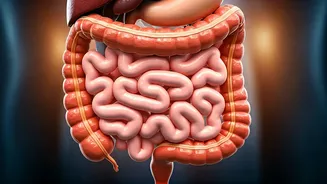The Gas Gauge
Flatulence, often referred to as passing gas, is a natural physiological process involving the release of gas from the digestive tract. It is produced
by the bacteria in your gut as they break down undigested food. Factors such as diet, the efficiency of your digestive system, and the types of bacteria present in your gut all play a role in determining how much gas you produce. While it might be a subject of humor, the amount of gas a person passes daily can actually provide clues about their digestive health. Understanding what is considered 'normal' helps in identifying potential problems or making dietary and lifestyle adjustments.
What's a Normal Amount?
Typically, the average person passes gas around 14 to 23 times per day. The volume of gas released can range from approximately 0.5 to 1.5 liters in a 24-hour period. It is important to remember that these numbers are just averages. Factors such as diet and individual digestive function can cause fluctuations. For example, high-fiber foods often contribute to increased gas production because they require more work from the gut bacteria. Conversely, certain digestive disorders and intolerances could also affect gas levels. Paying attention to any changes in your gas frequency, volume, or associated symptoms can be an important part of maintaining good digestive health and well-being.
Causes of Excess Gas
Several factors can lead to increased gas production. Diet plays a crucial role. Foods high in carbohydrates, particularly those containing complex sugars like fructose, lactose, and raffinose, are common culprits. These sugars are poorly absorbed in the small intestine, providing a feast for gut bacteria in the large intestine, resulting in gas. Swallowing air, which can happen while eating too quickly, chewing gum, or drinking carbonated beverages, also adds to the gas in your digestive tract. Moreover, certain medical conditions like irritable bowel syndrome (IBS), celiac disease, and lactose intolerance can lead to increased gas. Understanding these causes helps you to make informed choices about your diet and lifestyle to reduce excessive gas.
Diet and Flatulence
Your diet directly influences the quantity of gas you produce. Certain foods are notorious for triggering gas. These often include beans, lentils, broccoli, cabbage, onions, apples, and artificial sweeteners. The reason is that these foods contain carbohydrates that are difficult to digest. When they reach the large intestine, bacteria break them down, producing gas as a byproduct. Recognizing these foods and being mindful of your intake can significantly reduce gas. Experimenting with portion sizes and the way you prepare these foods might also help. For example, cooking beans thoroughly before consumption can make them easier to digest. Keeping a food diary to correlate what you eat with gas symptoms can also prove useful.
Lifestyle's Influence
Lifestyle habits beyond diet also significantly influence flatulence. Eating habits, specifically, influence gas. Eating quickly and not chewing food properly can lead to swallowing more air, which then results in increased gas. The consumption of carbonated beverages, such as sodas and sparkling water, also contributes to gas because of the carbon dioxide they contain. Moreover, regular exercise and adequate hydration can improve overall digestive function, helping to regulate gas production. Certain medications, like some antibiotics or those containing sorbitol, might also affect gas. Being mindful of these aspects of your lifestyle can empower you to reduce excessive flatulence and improve your overall well-being.
Managing Flatulence
There are several strategies to reduce excessive gas. Making dietary adjustments is a primary step. Identifying and limiting gas-producing foods is often helpful. Over-the-counter medications, like simethicone, may also provide relief by breaking up gas bubbles. Probiotics can also be useful, as they introduce beneficial bacteria into the gut, potentially improving digestion and reducing gas. Developing mindful eating habits, such as eating slowly and chewing food thoroughly, helps in reducing air swallowing. In more severe cases, when gas is accompanied by bloating, pain, or changes in bowel habits, consulting a healthcare professional is crucial. They can help identify any underlying medical conditions and provide personalized recommendations.













